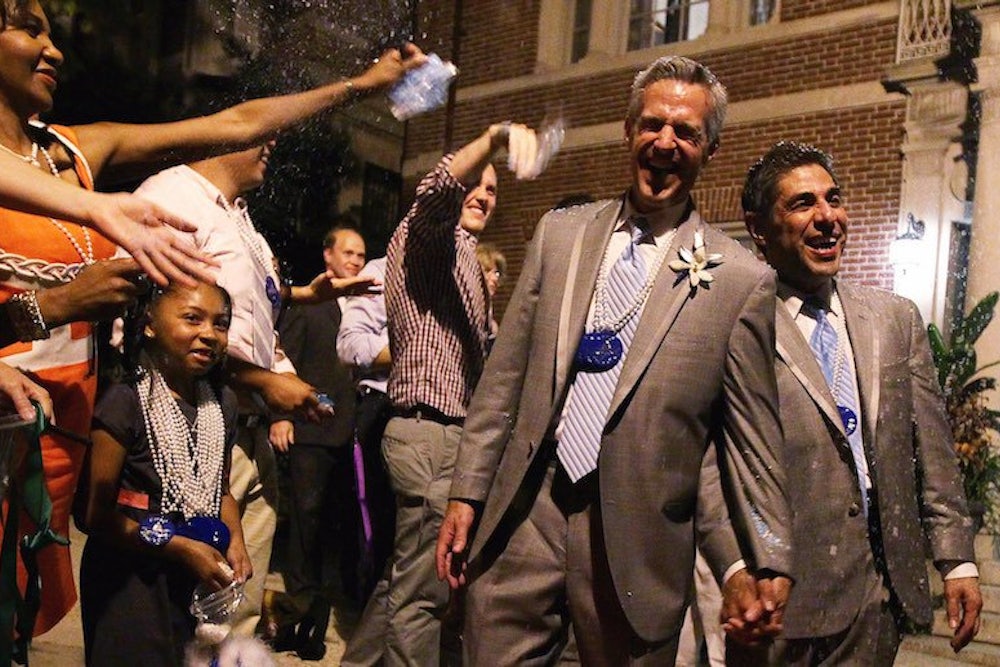This week, researchers at the University of Cambridge in Britain and the Weizmann Institute of Science in Israel made the startling announcement that male same-sex couples may soon be able to have biological children of their own. Their studies have shown that for the first time, human egg and sperm cells can be created from the skin cells of two adults of the same gender. Using these embryonic stem cells, the scientists were able to create primordial germ cells (PGCs), which can then go on to become eggs and sperm (because of the lack of the Y chromosome in females, the study limits this possibility to two males thus far). While the process has yet to create mature eggs and sperm, Dr. Joseph Hanna of the Weizmann institute says he is “optimistic,” and that same-sex biological parents could be a reality as soon as 2017.
The timing of this news is ironic or upsetting, depending on your point of view: A new study by Catholic University professor Donald Sullins, published in the February issue of the British Journal of Education, Society & Behavioural Science, once again raises the question of whether children raised by same-sex parents are more likely to suffer from emotional issues than children with heterosexual parents. Sullin concludes:
The reduced risk of child emotional problems with opposite-sex married parents compared to same-sex parents is explained almost entirely by the fact that married opposite-sex parents tend to raise their own joint biological offspring, while same-sex parents never do this. The primary benefit of marriage for children, therefore, may not be that it tends to present them with improved parents ... but that it presents them with their own parents.
Sullins's research—with its large sample size and numerous citations and statistics, giving it the veneer of academic rigor—has already been taken up by many conservative outlets as further proof that same-sex marriage should be illegal. As the Supreme Court prepares to rule on the constitutionality of same-sex marriage, his claims represent the last remaining argument conservatives have: that same-sex unions are harmful to children. Never mind that most courts have already dismissed this argument as beside the point, since children are not the sole purpose of marriage. As The Atlantic pointed out, most studies show quite the opposite, confirming that children of stable same-sex couples are as emotionally well-adjusted as children of straight couples.
In an email to The Atlantic, Sullins wrote, "Every child who is the biological child of a same-sex parent also has an absentee parent somewhere.... [A]s the child comes to understand where babies come from, it is inevitable that she will wonder about her own origins, and may experience rejection or stress at the relative absence of her other parent." But it is precisely Sullins's reliance on biology as the underlying determinant for the emotional well-being of these children that stands to be undermined by the Cambridge/Weizmann findings. For even if we were to accept Sullins's argument, it will hold no water against the potential new batch of gay men who choose to have biological children of their own. Since these parents will both be the child's biological parents, these children will therefore experience none of the “rejection or stress” Sullins refers to.
Likely, Sullins thought he'd be able to hold onto the “obvious” logic of his conclusions for more than a week. Talk about unfortunate timing. But it's not as if the issue of engineering children from stem cells doesn't raise certain ethical questions, not the least of which is the possibility of people taking advantage of the process to manufacture “designer” babies.
I have other misgivings. The opportunity to raise an entirely biological child, something most gay men likely never thought possible before this announcement, may prove tempting to many couples who otherwise might have adopted or become foster parents. In fact, it's precisely because gay couples can't have a joint-biological child that so many of them choose to adopt or become foster parents (thereby eliminating a tough decision: which parent gets to be the biological father?). The last decade has seen a dramatic rise in the number of gay couples either adopting or becoming foster parents, which, given the critical shortage of parents qualified to provide foster care, has certainly benefited our society. There's also something wonderful about the selflessness of adoption and foster care.
How strange it is, and how surprisingly quick, that gay men and women, once left out of the societal pressures of marriage and parenthood, will now feel pressure to produce biological offspring. The appeal of passing on your genes—and the pressure to do so by their parents—will likely prove too great for many of these couples. The prospect of conquering this final frontier of otherness is certainly thrilling, but there is something to be said about the makeshift families gay men and women, often rejected by their own biological families, have striven to create: families connected through love and a desire to form their own sense of family and community, ones not necessarily tethered to biology.
